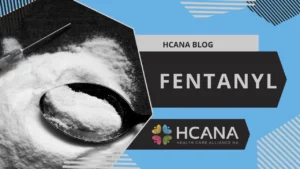Fentanyl is truly one of the most dangerous and addictive drugs currently circulating within the United States and abroad. Fortunately, there are a number of effective options when it comes to treatment for fentanyl addiction. One of these many forms of treatment is medication-assisted treatment, commonly abbreviated as MAT. However, like any other type of treatment, medication-assisted treatment for fentanyl addiction comes with a unique list of pros and cons, which can often help a person decide if it is a form of treatment that is worth pursuing.
Fentanyl Explained
Like many other opioids, fentanyl is incredibly harmful for its users and abusers. But, what exactly is it, and how does it affect a person?
What is Fentanyl?
Fentanyl is an extremely powerful and addictive synthetic opioid. As a drug, it is similar to morphine; however, it can be anywhere from 50 to 100 times more powerful. Usually, fentanyl is prescribed to individuals who have just undergone surgery and are dealing with immense pain. However, it can also be prescribed to individuals living with serious chronic pain. Despite this, fentanyl, like dozens of other prescription drugs, is often trafficked and sold illegally throughout the United States and elsewhere.
Effects of Fentanyl
Fentanyl can have numerous effects on a user. These effects include:
- Euphoria
- Nausea
- Constipation
- Confusion
- Drowsiness
- Sedation
- Trouble breathing
- Unconsciousness
Addiction and the Brain
If a person becomes addicted to fentanyl, they are at a greater risk for serious side effects like an overdose or a restructuring of their brain. Repeated fentanyl abuse over prolonged periods of time damages the brain’s reward system. Because of this, fentanyl abuse can make a person more likely to engage in addictive behavior. It can also make dramatic changes to their mood and behavior in general. Becoming sober is the only way to help restore the brain after an addiction is developed.
What is Medication-Assisted Treatment?
Medication-assisted treatment (MAT) is one of the many forms of substance abuse treatment. This form of treatment utilizes medications alongside counseling or behavioral therapy in order to provide a patient with more comprehensive treatment. The medications given to patients during MAT help restore their brain’s normal chemistry, block the effects of opioids like fentanyl, relieve cravings for fentanyl, and reestablish usual bodily functions without dependence on fentanyl. All of the medications used in MAT are approved by the Food and Drug Administration (FDA) and are tailored to meet the unique needs of every patient.
Pros of Medication-Assisted Treatment for Fentanyl Addiction
Medication-assisted treatment is one of the most widely utilized forms of addiction treatment in the United States, especially for treating fentanyl addiction. The popularity of MAT for fentanyl addiction is largely due to its list of pros.
The pros of using MAT for fentanyl addiction include:
- Eliminating cravings for fentanyl and other opioids
- Easing symptoms of withdrawals
- Reducing the risk for an overdose and death by overdose
- A greater likelihood of continuing addiction treatment
- Decrease in fentanyl use (since opioids will be ineffective during treatment)
- Aids in preventing a relapse
The medications used during MAT make opioids like fentanyl ineffective. If a person consumes fentanyl while receiving MAT, the fentanyl will have no effect on them physically or mentally. This is because the medications block the ability for opioids to attach to receptors in the body, preventing them from delivering pain relief and euphoria to their user. For many living with fentanyl addiction and other opioid addictions, blocking the ability to receive any sort of pleasure from an opioid allows them to more easily stay away from and off of opioids.
Cons of Medication-Assisted Treatment for Fentanyl Addiction
For many people living with a fentanyl addiction, MAT is a beneficial form of treatment. However, it does not work for every person. Like any other form of addiction treatment, MAT has its fair share of drawbacks – many of these are largely dependent on the needs of individual patients.
The cons of using MAT for fentanyl addiction include:
- Taking medications
- Ingesting medications that often have unwanted side effects
- Needing consistent medical supervision
- A potential to misuse or abuse medications
- A potential to trade one addiction for another
Medication-assisted treatment for fentanyl addiction works, and it works for a significant number of people who need treatment. But, it will never work for every person. Some should even avoid MAT. For example, a person should not seek medication-assisted treatment if they are not comfortable with taking medications, especially medications that may cause some unwanted side effects. A person with a fentanyl addiction should also not seek MAT if they are unwilling to be under constant medical supervision.
Use Whatever Treatment Works for You
Medication-assisted treatment is an undeniably popular form of addiction treatment for those living with fentanyl addiction. However, as previously noted, MAT is not right for every person with an addiction. Every individual is unique. This means every individual usually needs their own form of specialized addiction treatment – no matter what needs they may have.
If any person desires to successfully overcome a fentanyl addiction and maintain a lifestyle of sobriety, they must commit to a form of treatment that meets their needs. If not, they are likely to relapse at some point, potentially before completing their treatment. Fortunately, in the United States, there are a wide variety of addiction treatments available that can help meet the unique needs of different individuals. These treatments typically vary in cost, level of commitment, type of care, and more.
Searching for Local Treatment for Fentanyl Addiction?
Fentanyl addiction can be extremely difficult for a person to overcome, but it is possible with the right help! If you or a loved one is searching for any kind of treatment for fentanyl addiction, professional assistance, treatment, and support are available near you! At Knoxville Recovery Center, our team of addiction specialists, medical professionals, and mental health experts utilize several types of effective treatments for fentanyl addiction, including medication-assisted treatment. We can help you become sober and remain sober. Contact us today for more information!











